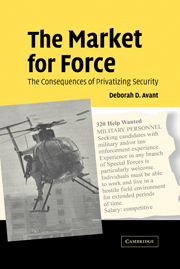Book contents
- Frontmatter
- Contents
- List of figure and tables
- List of acronyms
- Acknowledgments
- 1 Introduction
- 2 Private security and the control of force
- 3 State capacity and contracting for security
- 4 Dilemmas in state regulation of private security exports
- 5 Private financing for security and the control of force
- 6 Market mechanisms and the diffusion of control over force
- 7 Conclusion
- Bibliography
- Index
1 - Introduction
Published online by Cambridge University Press: 22 September 2009
- Frontmatter
- Contents
- List of figure and tables
- List of acronyms
- Acknowledgments
- 1 Introduction
- 2 Private security and the control of force
- 3 State capacity and contracting for security
- 4 Dilemmas in state regulation of private security exports
- 5 Private financing for security and the control of force
- 6 Market mechanisms and the diffusion of control over force
- 7 Conclusion
- Bibliography
- Index
Summary
… a state is a human community that (successfully) claims the monopoly of the legitimate use of physical force within a given territory
Weber…the extent to which the state has a monopoly of physical force and the extent to which the use of physical force is legitimate are variables, not elements of a definition.
LeviIt is common sense that the control, sanctioning, and use of violence fall to states. Weber's definition of the state is the obvious starting point in most investigations and even those who argue that globalization and the rise of non-state actors have affected vast portions of the world's political arena generally assume that coercive power still resides with the state. Private security activity in the last two decades, though, should lay waste to this conventional wisdom. When the US won a resounding victory against the Iraqi Army in 2003, one out of every ten people it deployed to the theater during the conflict were employed by private security companies (PSCs) performing the work (logistics, operational support of weapons systems, and training) that used to be done by military personnel. As lawlessness followed the fall of the Iraqi government and coalition forces were stretched thin, an “army” of private security personnel flooded into the country. Some were hired by the Coalition Provisional Authority (CPA) to train the Iraqi police force, the Iraqi army, and a private Iraqi force to guard government facilities and oil fields.
- Type
- Chapter
- Information
- The Market for ForceThe Consequences of Privatizing Security, pp. 1 - 39Publisher: Cambridge University PressPrint publication year: 2005

